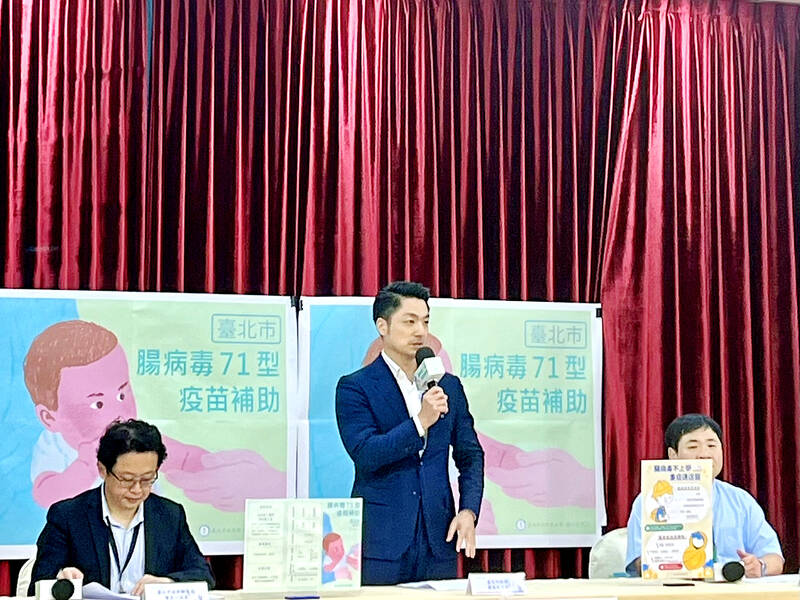From June 17, children aged two months to six years who are residents of Taipei and eligible for “category 2” medical subsidies would be offered free enterovirus 71 (EV71) vaccinations, the Taipei Department of Health said yesterday.
Taipei Mayor Chiang Wan-an (蔣萬安) said that Taiwan has entered the epidemic period for enterovirus infection, with Ministry of Health and Welfare data showing that in the past few weeks, weekly hospital visits for enterovirus were the highest in a decade.
Chiang said that his third son, who is about 18 months old, has contracted enterovirus twice.

Photo: Chiang Tsai-chen, Taipei Times
His wife had a hard time taking care of the ill child, who would often wake up in the middle of the night, and had throat blisters, which made drinking milk difficult, and rashes, he said.
Suspension of classes due to enterovirus infections affects dual-income families, as parents might have to take leave to take care of a sick child, he said, adding that children under age six are more at risk of developing severe illness.
To help address these issues, the city is offering free EV71 vaccinations, with the policy expected to benefit about 800 children, he said.
Category 2 medical subsidies are available to children with a rare disease, catastrophic illness, extremely low birth weight, those from low-income households or families facing special circumstances, as well as other exceptional cases, the department said.
Some young children who contract EV71 might develop neurological complications and vaccination can reduce the risk of severe illness, Taipei Department of Health Commissioner Chen Yen-yuan (陳彥元) said.
However, even children vaccinated against EV71 are still prone to infection from other enterovirus strains, so they should wash their hands thoroughly and frequently, Chen said.
Eligible recipients can get vaccinated at contracted hospitals in the city by presenting their Child Health Handbook and National Health Insurance card, the department said, adding that the vaccination fee would be exempted on site.
There are two brands of vaccine available and both need two doses for full vaccination, Chen said.
Enimmune Corp’s EnVAX-A71 vaccine has a second dose to be administered at least 28 days after the first, while the two doses of Medigen Vaccine Biologics Corp’s EV71 vaccine (Envacgen) should be at least 56 days apart, he said.
Chi Hsin (紀鑫), director of MacKay Memorial Hospital’s division of pediatrics, said that the most common symptoms of enterovirus infection are a fever for about one to four days, throat blisters or ulcers, and a sore throat, which sometimes is so painful that that the patient refuses to eat or drink, potentially leading to dehydration.
Another common symptom is rashes, sometimes with blisters, mainly on the hands and feet, Chi said, adding that most people recover on their own, but some develop severe complications, including myocarditis and encephalitis.
Signs of severe complication include drowsiness, reduced consciousness, continuous vomiting, rapid breathing and heartbeat, limb weakness and muscle spasms, Chi said, adding that if a child with the disease exhibits one or more of the symptoms, they should be rushed to an emergency room at one of the 14 contracted hospitals in Taipei.

Three Taiwanese airlines have prohibited passengers from packing Bluetooth earbuds and their charger cases in checked luggage. EVA Air and Uni Air said that Bluetooth earbuds and charger cases are categorized as portable electronic devices, which should be switched off if they are placed in checked luggage based on international aviation safety regulations. They must not be in standby or sleep mode. However, as charging would continue when earbuds are placed in the charger cases, which would contravene international aviation regulations, their cases must be carried as hand luggage, they said. Tigerair Taiwan said that earbud charger cases are equipped

UNILATERAL MOVES: Officials have raised concerns that Beijing could try to exert economic control over Kinmen in a key development plan next year The Civil Aviation Administration (CAA) yesterday said that China has so far failed to provide any information about a new airport expected to open next year that is less than 10km from a Taiwanese airport, raising flight safety concerns. Xiamen Xiangan International Airport is only about 3km at its closest point from the islands in Kinmen County — the scene of on-off fighting during the Cold War — and construction work can be seen and heard clearly from the Taiwan side. In a written statement sent to Reuters, the CAA said that airports close to each other need detailed advanced

Tropical Storm Fung-Wong would likely strengthen into a typhoon later today as it continues moving westward across the Pacific before heading in Taiwan’s direction next week, the Central Weather Administration (CWA) said. As of 8am, Fung-Wong was about 2,190km east-southeast of Cape Oluanpi (鵝鑾鼻), Taiwan’s southernmost point, moving westward at 25kph and possibly accelerating to 31kph, CWA data showed. The tropical storm is currently over waters east of the Philippines and still far from Taiwan, CWA forecaster Tseng Chao-cheng (曾昭誠) said, adding that it could likely strengthen into a typhoon later in the day. It is forecast to reach the South China Sea

WEATHER Typhoon forming: CWA A tropical depression is expected to form into a typhoon as early as today, the Central Weather Administration (CWA) said yesterday, adding that the storm’s path remains uncertain. Before the weekend, it would move toward the Philippines, the agency said. Some time around Monday next week, it might reach a turning point, either veering north toward waters east of Taiwan or continuing westward across the Philippines, the CWA said. Meanwhile, the eye of Typhoon Kalmaegi was 1,310km south-southeast of Oluanpi (鵝鑾鼻), Taiwan’s southernmost point, as of 2am yesterday, it said. The storm is forecast to move through central